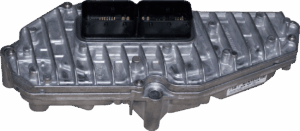Renault/Dacia DC4 Automatic Gearbox TCU: Heat-Related Failures and Seasonal Symptoms
The DC4 dual-clutch automatic gearbox (known as EDC at Renault, Getrag 6DCT250) is widely used. While it offers a smooth driving experience, its control unit (TCU) can be a source of specific failures, often exacerbated by thermal conditions and exhibiting a seasonal nature, leading to vehicle immobilization.
With holidays and warm weather approaching, this article helps you understand the common malfunctions of the DC4 TCU, especially those related to heat, identify the sometimes-intermittent symptoms, and consider specialized repair.
The DC4 TCU: The Heat-Sensitive Brain of Renault and Dacia Transmissions
The TCU (Transmission Control Unit) for the DC4 automatic gearbox controls the dual-clutch transmission. It manages the clutch actuators, controls gear shifting, interprets sensor signals, and communicates with other control units.
Located directly on the gearbox, this control unit is subjected to significant thermal and vibrational stress, which can affect its lifespan and the occurrence of failures, particularly in hot weather.
A failure of this TCU, with common part numbers including 310320093R, A2C30743000, or A2C53370092, can lead to major malfunctions, which are sometimes more frequent in summer or after a demanding drive.
Symptoms of a Defective DC4 TCU: The Impact of Heat
Identifying a DC4 TCU failure requires special attention, as heat can make the symptoms intermittent or worsen them.
The Influence of Temperature: Often Seasonal Failures
It is not uncommon for the first signs of a DC4 TCU failure to appear or intensify when the engine bay and the gearbox reach high temperatures (long trips, city driving in hot weather). The symptoms may even disappear temporarily after cooling down.
Gear Shifting Problems (more pronounced when hot)
- The gearbox gets stuck in one gear (limp mode).
- Impossible to shift gears, or only certain gears are available.
- Harsh gear shifts with significant jerking.
These problems can be constant or, more typically for heat-related failures, appear after a certain amount of driving time or during high ambient temperatures.
Dashboard Alerts (often after temperature rise)
- Engine or transmission warning light is on.
- Flashing of the engaged gear indicator (e.g., “N” flashes), especially when hot.
Specific Fault Codes (may appear when hot)
Reading fault codes (DTCs) that point to internal TCU malfunctions.
Examples: P072C to P072F, P090C, P090D, P091C, P091D, etc.
The appearance of these codes can also follow a thermal pattern: absent when cold, they manifest once the control unit is up to temperature.
Failure to Start (sometimes related to TCU temperature)
The vehicle refuses to start. This symptom can also be intermittent and linked to the TCU’s temperature.
Diagnosis: External Checks Before Blaming the DC4 TCU
Same checks as before (Oil level, Battery, Connectors, Sensors, software updates), but keep in mind that if the symptoms are clearly heat-related, this strengthens the suspicion of a TCU issue.
When to Strongly Suspect an Internal TCU Failure (Especially if Heat-Sensitive)?
If external checks have revealed nothing and the symptoms are clearly correlated with the temperature increase in the engine bay or gearbox (e.g., correct operation when cold, followed by progressive degradation when hot), the suspicion of an internal TCU failure due to thermal sensitivity is very high.
NEVER attempt to open or tinker with a DC4 TCU.
Choose Repair
Malfunctions of the DC4 automatic gearbox TCU, especially those related to its thermal sensitivity which can manifest seasonally, can be complex. A diagnosis that pays close attention to the conditions under which symptoms appear (especially heat) is crucial.
Faced with a confirmed failure, the specialized repair offered by Reparlab by Faurecia Clarion is an expert, reliable, and cost-effective alternative that takes these specific issues into account. By respecting the integrity of the part, you benefit from our R&D know-how and our certified processes.
Have questions? Find your answers here!
Are DC4 TCU failures more frequent in summer or in hot weather?
Yes, this is a common observation. The heat from the engine bay and that generated by the gearbox itself can prematurely damage the TCU’s electronic components. Symptoms may appear or worsen when the control unit is hot, and sometimes temporarily disappear after the vehicle has cooled down. This is an important indicator during diagnosis.
Is a repaired DC4 TCU as reliable as a new part, especially concerning heat?
Yes. At Reparlab, our repairs aim to correct the original defects and reinforce the components, taking thermal stress into account. Our IATF 16949 and ISO 14001 certifications attest to the quality of our processes.
What is the warranty on a DC4 TCU repair?
We offer a 24-month warranty on all our automotive electronic part repairs.
What should I do if the exact part number of my DC4 TCU is not on your list?
Our catalog is constantly evolving. If your reference isn’t listed, feel free to contact us. We are always exploring new repair opportunities.
